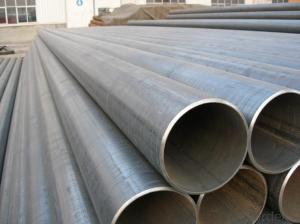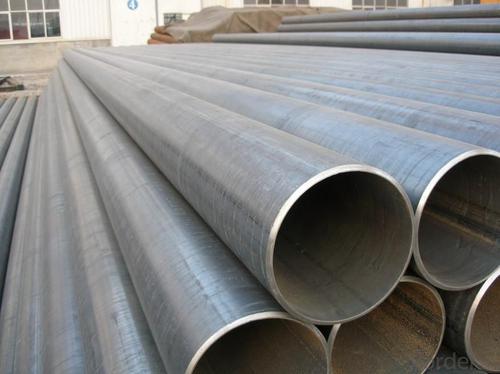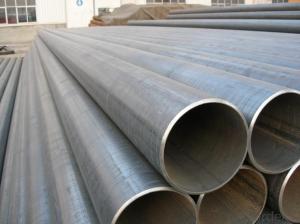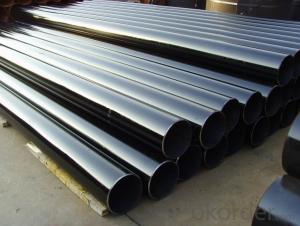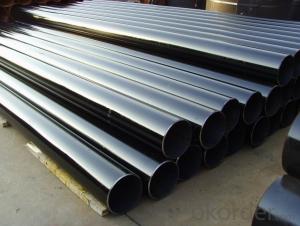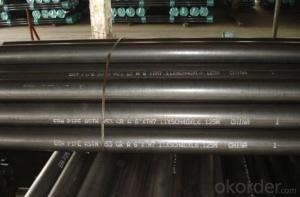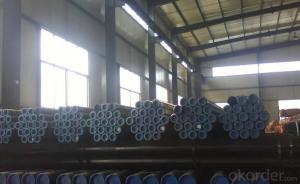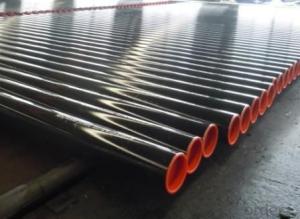ERW STEEL PIPE API 5L GR.B
- Loading Port:
- China Main Port
- Payment Terms:
- TT OR LC
- Min Order Qty:
- -
- Supply Capability:
- -
OKorder Service Pledge
OKorder Financial Service
You Might Also Like
1)Outside Diameter: 10.3mm--914.4mm
2)Wall Thickness: 0.5~59.54mm
3)Length: Random 1~12m or fixed 6
4)Material quality: ASTM A106 / A53/A210, API 5L,API 5CT,DIN, EN, GB/T8162 / 8163, etc
5)Packing:Hexangular packing in bundles
6)Export: Europe, North America, the Middle East, Africa, Asia and other countries and regions, well received by consumers!
Product Name: | ERW pipe | |
Size | OD | 1/8” -24” (10.3mm-914.4mm) |
Wall Thickness | 0.5mm-59.54mm SCH30,SCH40,STD,XS,SCH80,SCH,XXS | |
Length | 1m-12m | |
Steel material | Q195,Q215,Q235,Q345,STL400,ST37-2,16Mn,X42,X52,X80,E235, Grade B, SS330,SPHC, S185,SS400,S235JR,ST52,STK500 | |
Standard | BS1387-1985,ASTM A53,ASTM A106,GB/T3091-93-2008,EN10129,JIS. | |
Usage | Used For irrigation,Structure, Accessorize And Construction | |
Ends | 1) Plain 2) Beveled 3) Threaded with Coupling & cap | |
Surface Treatment | 1) Bared 2) Black Painted (varnish coating) 3) Galvanized 4) With Oiled | |
Technique | Electronic Resistance Welded (ERW ) Electronic Fusion Welded (EFW) Double Submerged Arc Welded (DSAW) | |
Welded Line Type | Longitudinal | |
Inspection | With Hydraulic Test, Eddy Current , Infrared Test | |
Package | In Bundle with water-proof package | |
Delivery | 1) Container 2) Bulk carrier | |
Port of Shipment | Xingang Port,Tianjin, China | |
Date of Delivery | 15 days after contract | |
Payment | L/C at sight or 30% T/T | |
Others | Fitting as coupler and flange also can be supplied. | |
- Q: What is the standard length of a steel pipe?
- The industry and application dictate the standard length of a steel pipe, which can vary. In general, steel pipes typically range from 18 to 24 feet in length. These lengths find common usage in construction, plumbing, and various industrial applications. It is worth mentioning that custom lengths are also available to accommodate specific project needs.
- Q: What are the specific differences between flexible pipes and rigid pipes?
- Watch from outside:The rigid waterproof sleeve is made up of steel bushing and wing ring, and the structure is simple;The flexible waterproof sleeve mainly consists of flange sleeve, sealing ring, flange, pressure plate, wing ring, bolt and nut. The structure is complicated.
- Q: Can steel pipes be used for water supply systems?
- Yes, steel pipes can be used for water supply systems. They are commonly used in many industrial and commercial applications due to their durability and strength. However, it is important to note that steel pipes need to be properly coated or lined to prevent corrosion and ensure water quality. Additionally, steel pipes may require more maintenance compared to other materials like PVC or copper.
- Q: What are the different methods of threading steel pipes?
- There are several methods for threading steel pipes, including manual threading using a handheld pipe threader, mechanical threading using a powered threading machine, and hydraulic threading using a hydraulic pipe threader. Additionally, some steel pipes can also be threaded using a die head or a threading lathe.
- Q: How are steel pipes used in the wastewater treatment industry?
- Steel pipes are commonly used in the wastewater treatment industry for various applications such as transporting wastewater, distributing chemicals, and constructing infrastructure such as treatment plants and pumping stations. The durability, strength, and corrosion resistance of steel pipes make them ideal for handling the harsh and corrosive nature of wastewater, ensuring efficient and reliable operations in the industry.
- Q: Are steel pipes suitable for use in pharmaceutical industries?
- Yes, steel pipes are suitable for use in pharmaceutical industries. Steel pipes are known for their durability, strength, and resistance to corrosion. These qualities make them ideal for transporting chemicals, gases, and liquids safely and efficiently within pharmaceutical facilities. Additionally, steel pipes can be easily cleaned and sanitized, ensuring the maintenance of high hygienic standards required in the pharmaceutical industry.
- Q: How can steel pipes be protected from corrosion?
- Steel pipes can be protected from corrosion through various methods. One common method is the application of protective coatings. These coatings act as a barrier between the steel and corrosive elements in the environment. The most widely used protective coating for steel pipes is epoxy, which provides excellent resistance to corrosion. Other coatings such as polyethylene and polyurethane can also be used depending on the specific application and requirements. Another effective way to protect steel pipes from corrosion is by cathodic protection. This technique involves the use of sacrificial anodes or impressed current systems to prevent corrosion. Sacrificial anodes, typically made of zinc or aluminum, are attached to the steel pipes. These anodes corrode instead of the steel, sacrificing themselves to protect the pipes. Impressed current systems, on the other hand, use a direct electrical current to counteract the corrosion process. Regular maintenance and inspection are crucial in the protection of steel pipes from corrosion. Monitoring the condition of the coatings, checking for any signs of damage or deterioration, and promptly addressing any issues can help prevent corrosion from occurring or spreading. Additionally, implementing proper drainage systems to avoid the accumulation of moisture around the pipes can further protect them from corrosion. Lastly, environmental factors should be taken into consideration when protecting steel pipes from corrosion. This includes mitigating exposure to corrosive substances, such as acids or chemicals, and ensuring proper ventilation and airflow to prevent the buildup of moisture and humidity. By implementing a combination of these protective measures, steel pipes can have an extended lifespan and maintain their structural integrity.
- Q: How are steel pipes used in plumbing systems?
- Steel pipes are commonly used in plumbing systems for their durability and strength. They are used to transport water, gas, and waste materials in both residential and commercial buildings. Steel pipes are known for their resistance to corrosion and high pressure, making them ideal for underground and outdoor applications. Additionally, steel pipes are often used for plumbing fixtures such as faucets, showers, and toilets, providing a reliable and long-lasting solution for water distribution and drainage.
- Q: How are steel pipes marked for identification?
- Pipe marking is a process used to identify steel pipes. This process involves placing labels or markers on the pipes' surface to provide important information about their specifications and characteristics. The labels typically include details such as the size, grade, material composition, manufacturer's logo or name, and any relevant codes or standards. These markings are crucial for proper identification and ensure that the right pipes are used for specific applications, as well as for maintenance and repair purposes. Furthermore, the markings also assist with quality control and traceability, making it easy to identify and track the pipes throughout their lifespan. In summary, using clear and durable marking systems to identify steel pipes is vital for safety, efficiency, and compliance in various industries where these pipes are used.
- Q: What are the different methods of wrapping steel pipes for corrosion protection?
- There are several different methods of wrapping steel pipes for corrosion protection. These methods can vary depending on the specific application and environmental conditions. Some of the common methods include: 1. Tape Wrapping: This involves wrapping the steel pipes with a corrosion-resistant tape, such as polyethylene or polypropylene tape. The tape acts as a barrier between the pipe surface and the corrosive elements, preventing direct contact and reducing the risk of corrosion. 2. Inner Wrapping: Inner wrapping involves applying a protective coating or lining to the inside surface of the steel pipe. This method is commonly used for pipes that transport fluids or gases, as it provides an additional layer of protection against corrosion from the inside. 3. External Coating: External coating is a widely used method for corrosion protection. It involves applying a protective coating to the outside surface of the steel pipe. The coating can be a variety of materials, such as epoxy, polyethylene, or polyurethane, which provide a barrier against corrosive elements and extend the lifespan of the pipe. 4. Cathodic Protection: Cathodic protection is an electrochemical method used to protect steel pipes from corrosion. It involves connecting the steel pipe to a sacrificial anode, such as zinc or magnesium, which corrodes instead of the pipe. This process helps to prevent the corrosion of the steel pipe by diverting the corrosive current away from the pipe surface. 5. Heat Shrink Sleeve: Heat shrink sleeves are commonly used for corrosion protection in underground or submerged applications. These sleeves are made of a heat-activated material that shrinks when heated, creating a tight seal around the pipe. The sleeve forms an effective barrier against moisture and corrosive elements, preventing direct contact with the steel pipe. 6. Fusion Bonded Epoxy (FBE) Coating: FBE coating is a thermosetting powder coating that is applied to the surface of the steel pipe and then fused to form a protective layer. This coating provides excellent adhesion and corrosion resistance, making it a popular choice for steel pipes in various applications. It is important to note that the selection of the appropriate method for wrapping steel pipes for corrosion protection depends on factors such as the environment, the type of corrosive elements present, the intended application, and other specific requirements. Professional advice and consultation may be necessary to determine the most suitable method for a particular situation.
Send your message to us
ERW STEEL PIPE API 5L GR.B
- Loading Port:
- China Main Port
- Payment Terms:
- TT OR LC
- Min Order Qty:
- -
- Supply Capability:
- -
OKorder Service Pledge
OKorder Financial Service
Similar products
Hot products
Hot Searches
Related keywords
